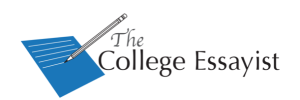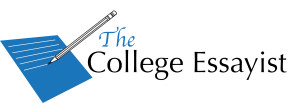I began the college application process in the Fall of 2013. I applied to a modest six universities, hoping to attend my dream school the following year, for screenwriting and film production. My mother was a little more excited about the process than I was. She turned an entire tri-fold into my college application checklist, complete with due dates, supplemental print-outs, and staff emails. She even re-hired my AP Literature tutor to guide me on the common application essay. Literally.
Before our first essay-writing session, the tutor had me develop a list of the most important events in my life, starting from birth. We then narrowed down the topics about which I felt most strongly. I ultimately decided to write on the most defining part of my life: struggling with various eating disorders and depression throughout middle school and high school.
The first few drafts were decent, but nothing I wanted anyone to read. I touched on extracurriculars, to demonstrate the well-roundedness everyone assured me admissions boards like to see. I mentioned meaningless awards and academic achievements to display my "fervor for learning." Somewhere in the process I managed to sprinkle anecdotes about the ubiquitous feeling of loneliness and the struggle to cope with academic and social pressures that motivated my conditions. However, the result felt utterly inauthentic. At first I doubted my struggle. Maybe there was no actual story to tell. But then I considered the scope of the story, and I figured it might help to focus on a shorter period of time.
Eventually, I realized that I was trying to sum up my entire life in those mere 650 words. I could not bring myself to reduce such a personal experience into a snippet for an admissions board who was unwilling to get to know me personally. It was then that I learned the hardest lesson about college application essays:
Concessions must be made in order to complete the application.
This seems like a rather cynical approach, but I assure you, as one of the many applicants an admissions director will review, there is some level to which you must sacrifice your identity. Simply, if you want to go to college, you need to identify an essay topic and just get it done.
Admissions directors understand that you can't be explained in just a few hundred words. They understand that the system is inherently unfair and they try desperately to work around this. All you need to give them is a story. Your story does not even need to be complete. We are taught so early on that our stories must follow a beginning, middle, and end, but some of the best stories are those which begin right in the heat of the action, or offer an ambiguous ending.
Realizing all this, I scrapped my original essay and all its drafts. I wrote a quick list of my most important qualities and values: brutal honesty, compassion, family, religion, and holistic education. Under each quality/value I referred to a specific event which best demonstrated my character. This time I ended up with five respectful essays which clearly captured my personality and character, not only as a student but as a person. I ended up submitting an essay on education, and how my years of homeschooling fueled a rejection of formal/standardized learning and in turn motivated me to tutor and mentor others. The other essay might have worked. Stories of depression can be personal and inspiring, but in the end, they are more complicated than the word limits allow. By rejecting the idea that my essay had to show how I overcame great obstacles and by ignoring the sensitivities which accompanied the word limit, I was able to craft an essay that, to this day, I am proud of. Very, very proud of.
In the end, I challenged my original thesis, that identity must be sacrificed. Yes, it is true that only so many of your parts can be forced into the square box, but there is a middle ground.
To sum this post up, and to offer more concrete advice:
The focus of your common application essay should be your values, not a specific event. Colleges are looking for personalities, not validating applicants' experiences.
- Understand that a university might require additional supplemental writings in which you can better develop a story or more complicated conflict. Some of these essays might not have a word limit.
- Do not write about anything you feel unsure or uncomfortable explaining. I think this is why my first essay did not pan out. Through the writing, I was trying to make sense of what happened. Be kind to yourself regarding essay topics.
- Take into consideration the environment of the school you are applying to. If UVA asks you to write about your favorite word, do not explain how you love an expletive (yes it has happened, and no she was not admitted). Understand if a school is looking for more radical thinkers and if they might appreciate experimental essays (cough cough University of Chicago).
- Relax. At the end of the day, an essay is not the end all be all. Have fun learning about yourself through the prompts. I personally liked to think of them as questions someone might ask you on a date to get to know you better. So, make the answer brief and exciting as if you were explaining it to someone you have just met!








